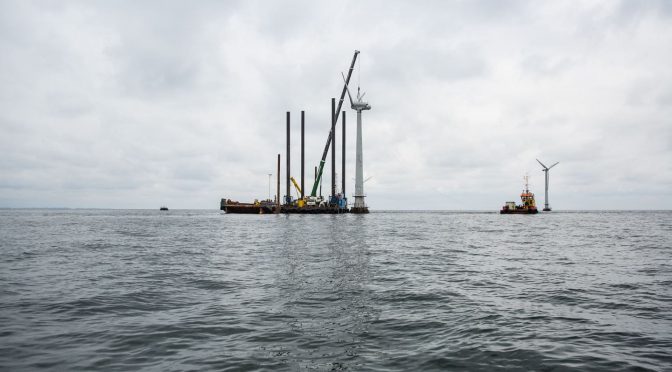Ørsted commits to either reuse, recycle, or recover all of the wind turbine blades in its global portfolio of onshore and offshore wind farms upon decommissioning. 
On Ørsted’s Capital Markets Day, the company announced its new commitment to either reuse, recycle, or recover all of the wind turbine blades in Ørsted’s global portfolio of onshore and offshore wind farms upon decommissioning. The commitment comes as a part of Ørsted’s new company strategy which includes an ambition to expand its leading sustainability position and as part of the work towards achieving a carbon-neutral footprint by 2040.
“We want to help create a world that runs entirely on green energy, and we want to do it in a sustainable way. That includes moving towards more circular models where we reuse resources and save energy, thereby reducing carbon emissions. That is a big challenge, but we look forward to working on this challenge together with our supply chain,” says Mads Nipper, CEO of Ørsted.
Today, between 85 % and 95 % of a wind turbine can be recycled, but recycling of wind turbine blades remains a challenge, as the blades are designed to be lightweight, yet durable, making them challenging to break apart. Consequently, most decommissioned blades are landfilled today. Should the challenge with recycling blades take longer to solve than anticipated, Ørsted will not use landfilling for decommissioned wind turbine blades, but will instead temporarily store the blades.
In the coming decade, wind turbines will be deployed at an unprecedented pace, delivering clean renewable energy to industries and to several hundreds of million people, making it even more important to decommission the blades in a sustainable way.
Ørsted has so far constructed 7.5 GW of offshore wind and 1.7 GW of onshore wind. Up until now, Ørsted has only decommissioned the offshore wind farm Vindeby in Denmark where the blades from the 11 wind turbines were all reused. With Ørsted’s new strategic ambition of installing 30 GW of offshore wind and 17.5 GW of onshore energy production, including onshore wind, by 2030, Ørsted has a clear responsibility to help find solutions to the challenge of recycling blades.
“Already today, power produced from offshore wind has 99 % lower life cycle emissions than coal-fired power. Our ambition is to offer our customers carbon-neutral renewable energy solutions with responsible use of resources, seen from a life cycle perspective. This requires decarbonising our supply chain, and it involves moving to more circular models of resource use in the wind turbine supply chain,” says Mads Nipper.
“I hope that our commitment will inspire others which will help to bring scale to the market for recycling solutions of wind turbine blades, thereby accelerating the cost-out journey of the alternatives to landfilling, and help boost the already ongoing innovation in the wind energy supply chain on how to design to avoid waste.”
Ørsted is already contributing to advance the technologies that can recycle wind turbine blades in a sustainable way as a founding partner of the cross-sector DecomBlades consortium consisting of wind industry companies and research institutions. The consortium seeks to investigate and develop solutions to recycle the composite material in wind turbine blades. The consortium recently received a three-year funding from Innovation Fund Denmark for its work.
“No one has all the solutions to how to move towards more circular models. We need collaboration across companies and research institutions to find the answers which the DecomBlades project is an important example of,” says Mads Nipper.
The Ørsted vision is a world that runs entirely on green energy. Ørsted develops, constructs, and operates offshore and onshore wind farms, solar farms, energy storage facilities, and bioenergy plants, and provides energy products to its customers. Ørsted ranks as the world’s most sustainable energy company in Corporate Knights’ 2021 index of the Global 100 most sustainable corporations in the world and is recognised on the CDP Climate Change A List as a global leader on climate action. Headquartered in Denmark, Ørsted employs 6,311 people. Ørsted’s shares are listed on Nasdaq Copenhagen (Orsted). In 2020, the group’s revenue was DKK 52.6 billion (EUR 7.1 billion).


